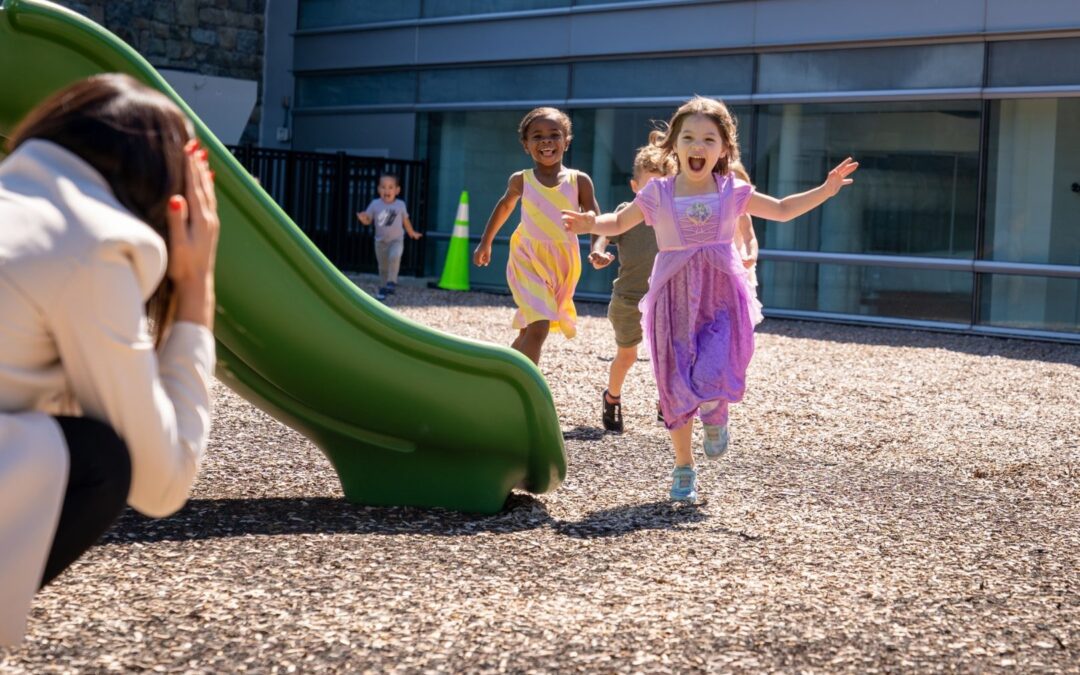Summer is the perfect time for children to explore the great outdoors, where playtime becomes an essential part of their growth and development. Outdoor activities are not just fun and games; they hold significant benefits for a child’s physical, social, emotional, and intellectual development. Let’s dive into how outdoor play can positively impact your child’s overall well-being.
Physical Development for Children
Outdoor activities are a fantastic way for children to improve their physical strength and coordination. Running, climbing, and playing sports contribute to building muscle strength and bone density, laying a solid foundation for lifelong health. Engaging in outdoor play also helps develop both fine and gross motor skills. Fine motor skills, which involve small muscle movements like picking up small objects, are honed through activities like drawing with sidewalk chalk or manipulating small toys in a sandbox. Gross motor skills, involving larger muscle groups used for movements like running, jumping, and climbing, are enhanced through active play on playgrounds, riding bikes, and playing sports. Moreover, engaging in outdoor play can help build a robust immune system through natural boosts. Whether it’s a game of tag or a session on the playground, these activities enhance physical fitness and promote a healthy lifestyle from an early age.
Social Development for Children
Playing outside offers children so many opportunities to interact with peers, building essential social skills like communication and collaboration. Whether they’re comforting a friend who fell off a jungle gym at the playground or cheering on friends in a game of kickball, outdoor play helps children improve their ability to understand and empathize with others. These interactions are crucial for developing strong communication skills and forming lasting friendships.
Emotional Development for Children
Unstructured physical activity is a powerful tool for improving mood and overall mental well-being. Engaging multiple senses and stimulating the production of endorphins, outdoor play has a positive impact on a child’s emotional health. Studies have shown that exposure to natural light and physical activity during the day can help regulate children’s sleep quality, further enhancing their mental health. The freedom and joy found in outdoor play allow children to express themselves freely and manage their emotions better.
Intellectual Development for Children
Every outdoor activity is like an adventure for the brain. Participation in these adventures helps stimulate multiple regions of the brain, enhancing cognitive function, problem-solving abilities, and creative thinking. Activities such as exploring nature, building sandcastles, or playing strategy-based games can significantly aid in brain development. Moreover, outdoor play encourages curiosity and can spark interest in new topics, fostering a love for learning that extends beyond the classroom.
Suggestions for Outdoor Play Activities for Preschoolers
To make the most of the developmental benefits of outdoor play, here are some engaging and fun activities for preschoolers:
- Nature Walks and Scavenger Hunts
- Take your preschooler on a nature walk and create a scavenger hunt list of items to find, such as leaves rocks, flowers, or insects. This activity promotes exploration and observational skills.
- Water Play
- Set up a small pool, water table, or sprinkler for some water play. Activities like pouring, splashing, and floating objects help develop fine motor skills and sensory experiences.
- Sandbox Fun
- A sandbox provides endless opportunities for imaginative play. Kids can build castles, dig tunnels, and create various structures, enhancing their creativity and problem-solving abilities.
- Obstacle Courses
- Create a simple obstacle course using household items or playground equipment. This encourages physical activity, coordination, and balance as children navigate through the course.
- Gardening
- Involve your child in gardening tasks like planting seeds, watering plants, and picking fruits or vegetables. Gardening teaches responsibility, patience, and an appreciation for nature.
- Outdoor Art
- Bring art supplies outside and let your child paint, draw with sidewalk chalk, or create nature collages using leaves, sticks, and flowers. This fosters creativity and artistic expression.
- Group Games
- Organize group games such as tag, hide and seek, or duck-duck-goose. These games promote social interaction, teamwork, and physical exercise.
- Bike Riding
- If your child has a tricycle or a balance bike, encourage them to ride around a safe, open area. Bike riding helps with balance, coordination, and builds confidence.
- Picnics
- Plan a picnic in a local park or even in your backyard. Let your preschooler help with packing snacks and setting up. Picnics can make mealtime fun and provide a relaxed outdoor experience.
The benefits of outdoor play are vast and multifaceted, encompassing physical, social, emotional, and intellectual development. This summer, encourage your children to step outside, explore, and play. Not only will they create cherished memories, but they will also build a strong foundation for lifelong health and well-being. With these suggested activities, preschoolers can enjoy a variety of experiences that contribute to their holistic growth and development.
For more tips on early childhood development, parenting, and outdoor activities for kids, visit the Celebree blog regularly. Enjoy the sunshine and have a fun-filled summer with your little ones!

